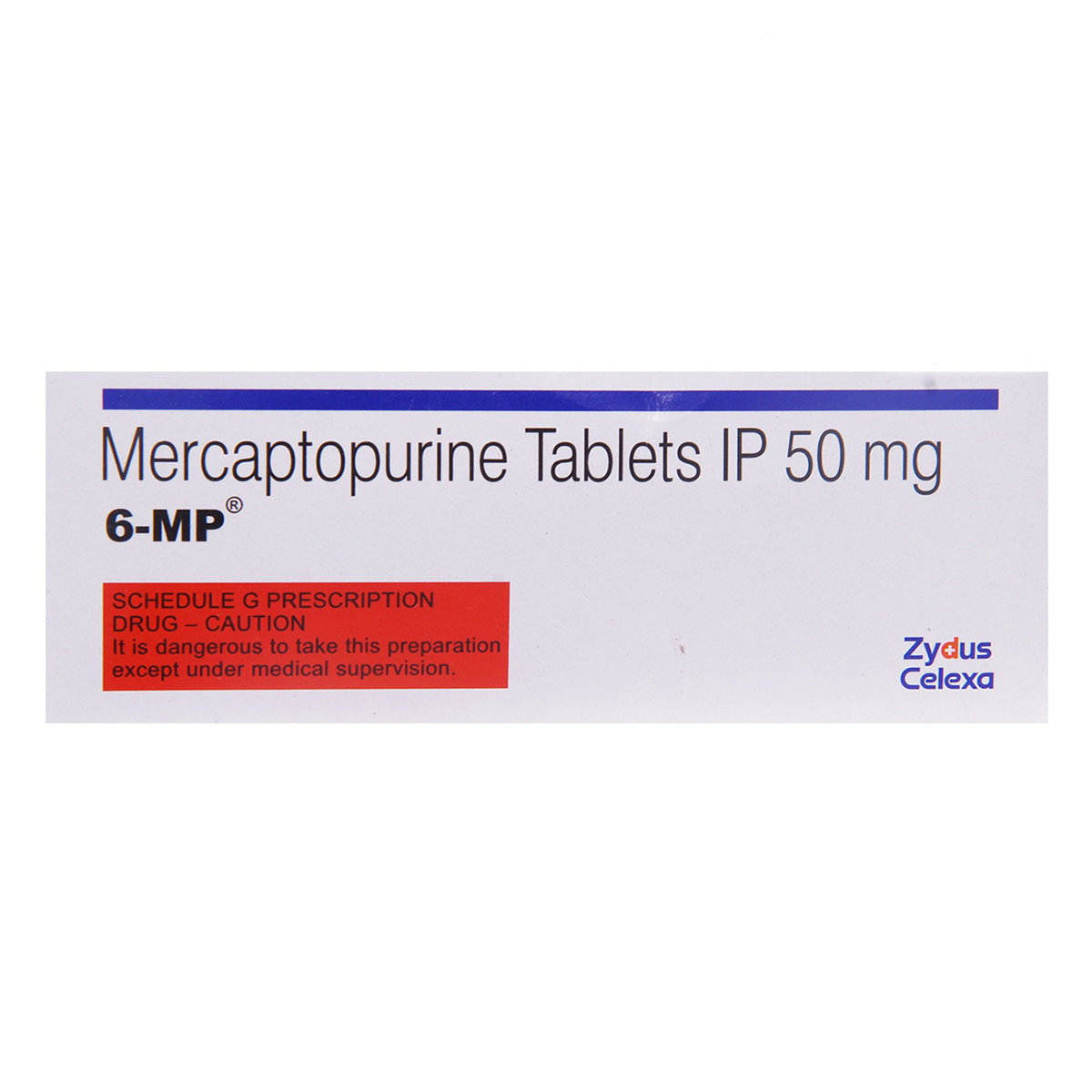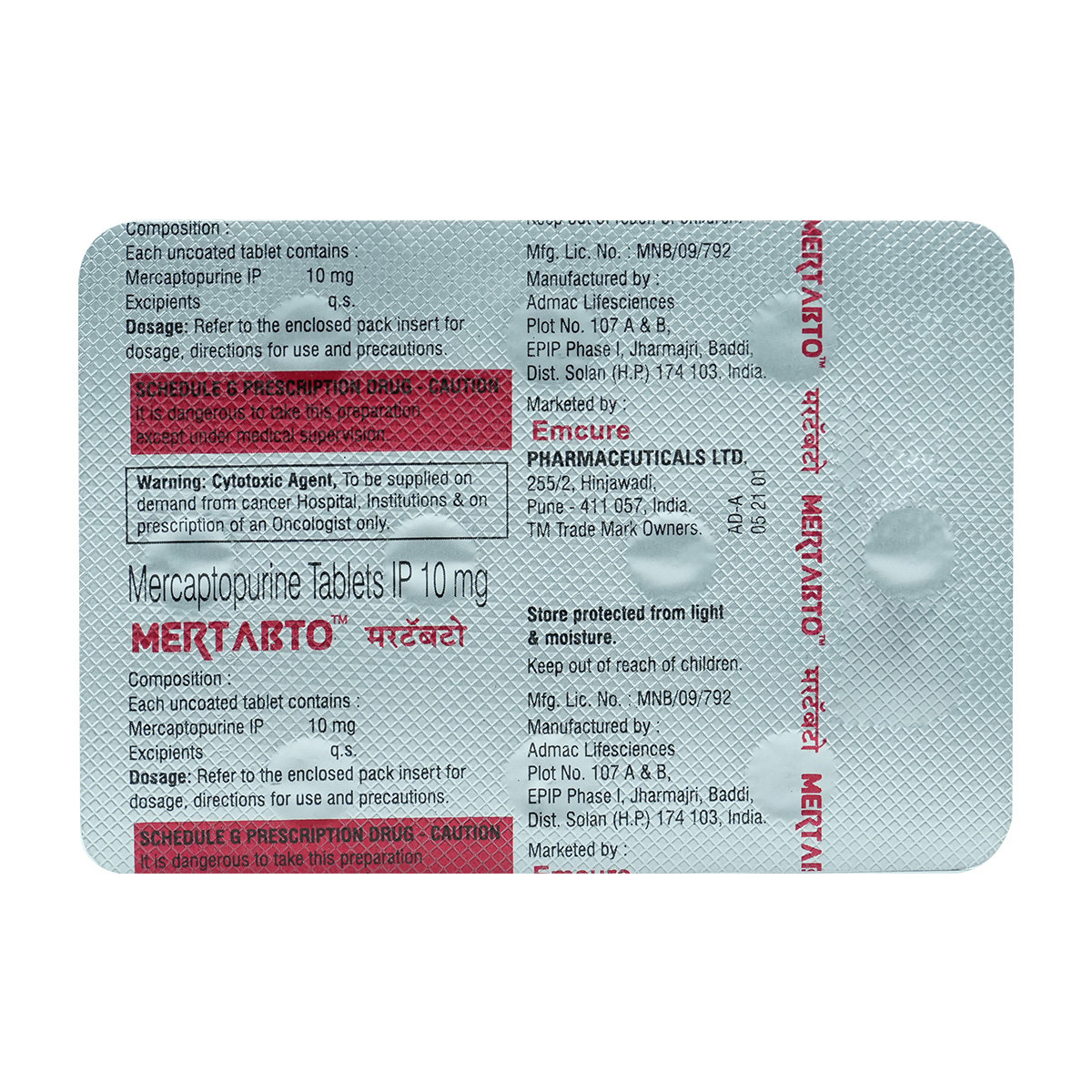Mercaptopurine
About Mercaptopurine
Mercaptopurine belongs to the class of medication called anticancer drugs used in the treatment of blood cancer. Blood cancer also known as leukaemia, is the cancer of blood cells. It causes excessive production of immature white blood cells by the bone marrow.
Mercaptopurine contains Mercaptopurine that works by interfering with the production of genetic material (DNA and RNA) in the cancer cells that are essential for growth, repair and multiplication of cells. Thus, Mercaptopurine stops multiplication of abnormal cells and leads to the growth of cells in an unbalanced way and causes the death of cells.
Take Mercaptopurine as prescribed by your doctor. You are advised to take Mercaptopurine for as long as your doctor has prescribed it for you based on your medical condition. In some cases, you may experience vomiting, nausea, low red blood cell count, loss of appetite, diarrhoea or inflammation of the mouth. Most of these side effects of Mercaptopurine do not require medical attention and gradually resolve over time. However, if the side effects persist or worsen, please consult your doctor.
If you are known to be allergic to Mercaptopurine or any other medicines, please tell your doctor. Avoid taking Mercaptopurine if you are pregnant or breastfeeding and consult a doctor. You are recommended to use effective contraceptive methods while using Mercaptopurine and for 3 months after completing the course of Mercaptopurine to prevent pregnancy. Mercaptopurine should be used with caution in children, especially in children below 6 years or with low body mass index as it may cause low blood sugar. Avoid excessive exposure to sunlight as Mercaptopurine may cause sensitivity to sunlight. You are advised to use a sunscreen with a high protection factor and wear protective clothing while going out. Mercaptopurine may increase the risk of a serious condition called macrophage activation syndrome (over activation of white blood cells associated with inflammation), especially in people with arthritis.
Uses of Mercaptopurine
Medicinal Benefits
Mercaptopurine contains Mercaptopurine, an anticancer drug used to treat blood cancer. Mercaptopurine interferes with the production of genetic material (DNA and RNA) in the cancer cells essential for growth, repair and multiplication of cells. Thus, Mercaptopurine stops multiplication of abnormal cells and leads to cell's growth in an unbalanced way and causes the death of cells.
Directions for Use
Storage
Side Effects of Mercaptopurine
- Nausea
- Vomiting
- Low red blood cell count
- Loss of appetite
- Diarrhoea
- Inflammation of the mouth
Drug Warnings
If you are allergic to Mercaptopurine or any other medicines, please tell your doctor. Avoid taking Mercaptopurine if you are pregnant or breastfeeding and consult a doctor. You are recommended to use effective contraceptive methods while using Mercaptopurine and 3 months after completing the course of Mercaptopurine to prevent pregnancy. Mercaptopurine should be used with caution in children, especially in children below 6 years or with low body mass index as it may cause low blood sugar. Mercaptopurine may increase the risk of infections. Therefore, consult your doctor if you notice any infection signs such as urinary problems, sore throat or mouth. Avoid excessive exposure to sunlight as Mercaptopurine may cause sensitivity to sunlight. You are advised to use a sunscreen with a high protection factor and wear protective clothing while going out. Mercaptopurine may increase the risk of a serious condition called macrophage activation syndrome (over activation of white blood cells associated with inflammation), especially in people with arthritis. If you are about to receive any vaccinations, inform your doctor that you are taking Mercaptopurine to cause infections.
Drug Interactions
Drug-Drug Interaction: Mercaptopurine may interact with medicines used to treat gout (thiopurinol, febuxostat, oxipurinol, allopurinol), anti-inflammatory drugs (mesalazine, sulfasalazine, olsalazine), blood thinner (warfarin, acenocoumarol), a drug used to treat various autoimmune diseases (infliximab), anticonvulsants (phenytoin, carbamazepine), antiviral drug (ribavirin).
Drug- Food Interaction: No interactions found.
Drug-Disease Interaction: If you have TPMT (thiopurine methyltransferase) deficiency, an inherited mutation in the NUDT15-gene (a gene involved in the breakdown of mercaptopurine in the body), Lesch-Nyhan syndrome (a genetic condition), shingles, chickenpox, hepatitis B infection, kidney or liver problems, inform your doctor before taking Mercaptopurine.
Drug-Drug Interactions Checker List:
Safety Advice

Alcohol
cautionInteraction of Mercaptopurine with alcohol is unknown. Please consult a doctor before consuming alcohol while using Mercaptopurine.

Pregnancy
unsafeMercaptopurine is a category D pregnancy drug and is not recommended for use during pregnancy, especially in the first 3 months as it may cause harm to the foetus. Please consult a doctor if you are pregnant or planning for pregnancy.

Breast Feeding
unsafeMercaptopurine is contraindicated in breastfeeding women. Please consult a doctor if you are breastfeeding.

Driving
safe if prescribedMercaptopurine usually does not affect your ability to drive or operate machinery.

Liver
cautionTake Mercaptopurine with caution, especially if you have a history of Liver diseases/conditions. The dose may be adjusted by your doctor as required.

Kidney
cautionTake Mercaptopurine with caution, especially if you have a history of Kidney diseases/conditions. The dose may be adjusted by your doctor as required.

Children
cautionMercaptopurine should be used with caution in children, especially in children below 6 years or with low body mass index as it may cause low blood sugar.
Habit Forming
Diet & Lifestyle Advise
- Maintain a balanced diet including fruits and vegetables rich in nutrients and low-fat proteins like lean meats, fish and poultry.
- Drink plenty of water daily while taking Mercaptopurine as some cancer therapies may cause dehydration.
- Exercise regularly and maintain a healthy body weight.
- Regularly wash your hands and avoid contact with people having infections.
- Quit smoking.
Special Advise
- Regular blood and urine tests are recommended while taking Mercaptopurine to monitor the number of red blood cells, platelets, white blood cells, uric acid levels, kidney or liver functioning.
- Do not receive any vaccination during treatment without your doctor's approval while taking Mercaptopurine.
Patients Concern
Disease/Condition Glossary
Blood cancer: It is the cancer of blood cells, also known as leukaemia. It causes excessive production of immature white blood cells by the bone marrow. The symptoms include unintentional weight loss, weakness, excessive sweating, tiredness, bone pain, frequent infections, chills or fever, red spots on the skin or painless, swollen lymph nodes, especially in the armpits neck. The risk factors of leukaemia include smoking, genetic or blood disorders, family history of leukaemia, exposure to high radiation levels, or previous cancer treatment with radiation or chemotherapy.
FAQs
Mercaptopurine contains Mercaptopurine that works by interfering with the production of genetic material (DNA and RNA) in the cancer cells that are essential for growth, repair and multiplication of cells. Thus, Mercaptopurine stops multiplication of abnormal cells and leads to the growth of cells in an unbalanced way and causes the death of cells.
Mercaptopurine may affect eggs or cause low sperm count. Therefore, please consult a doctor before taking Mercaptopurine if you are planning to become parents.
Mercaptopurine may increase sensitivity to sunlight or UV light. Therefore, avoid or limit exposure to the sun for a long time or artificial light such as tanning beds. Wear protective clothing and use a sunscreen before going out in the sun.
Mercaptopurine may cause low blood sugar levels in children below 6 years and those having low body weight. Therefore, use Mercaptopurine with caution in children and if you notice any symptoms such as dizziness, excessive sweating, confusion or nausea, please consult a doctor immediately.
If you are about to receive any vaccinations especially live vaccines such as measles vaccine, flu vaccine, BCG vaccine, etc., it is advised to inform your doctor that you are on treatment with Mercaptopurine as it may cause infections.
Mercaptopurine may increase the risk of infections. Therefore, consult your doctor if you notice any signs of infection such as urinary problems, chills, fever, cough, sore throat or mouth and avoid contact with people having cold, flu or infection.





